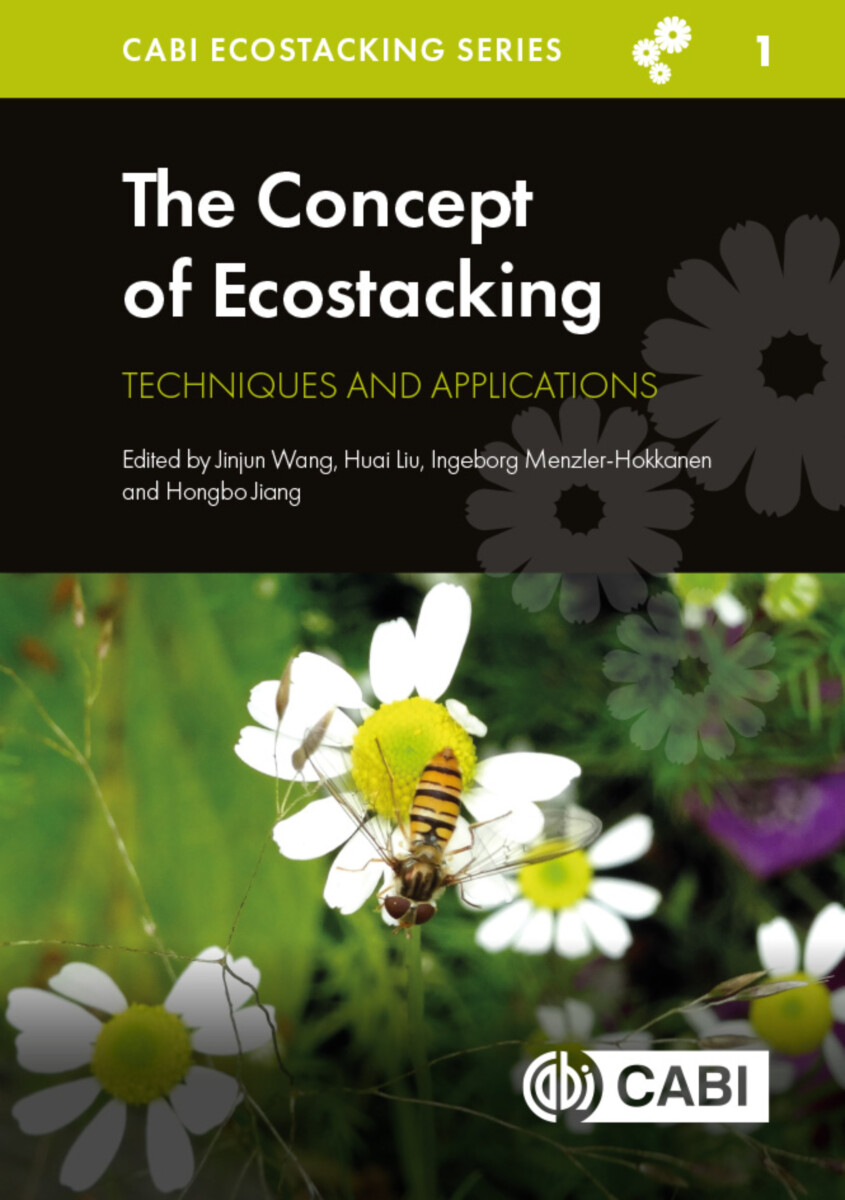- Publisher
CABI - Published
14th March 2024 - ISBN 9781789248692
- Language English
- Pages 288 pp.
- Size 6" x 9"
Ecostacking is a new concept and approach which maximizes the benefits of ecosystem service providers in cropping systems to help achieve the goal of long-term sustainable agriculture and food production. The term "ecostacking" means combining synergistically the beneficial services of functional biodiversity from all levels and types. It is a comprehensive approach, where the various ecosystem service providers are fully integrated with the rest of the cropping system including agronomic practices. It is an approach which goes beyond conventional Integrated Pest Management practices, and attempts to take advantage of all the functional biodiversity of a system.
The main focus of ecostacking is on maximizing ecosystem services for biological control and pollination from beneficial arthropods, but the approach also utilizes other invertebrates (e.g., earthworms) as well as beneficial vertebrates such as bats, birds and small mammals. Microbes also provide invaluable ecosystem services including pest, disease, and weed control, either directly as components of "suppressive soils" or as plant colonizers (as endophytes or as epiphytic microbial flora). The ecostacking approach also aims to maximize other nature-provided services such as maintenance of soil health and nutrient cycling.
The Concept of Ecostacking is the first book in a series which introduces ecostacking concepts to the reader and explores how this approach can be used in a variety of ways and in different cropping systems. The book defines this new concept and shows, using illustrative case studies from around the world, how ecostacking principles can be successfully employed in cropping systems in the open field, in greenhouses, and in forestry.
This book:
- will serve as inspiration for developing further applications of this breakthrough technology for sustainable agricultural production.
- is a must-read for everyone with an interest in developing sustainable crop protection systems and ecosystem management.
- has been written and edited by the world's leading experts in this new and exciting endeavor.
Preface
List of Contributors
PART I THEORETICAL PRINCIPLES AND CONCEPTS OF ECOSTACKING IN SUSTAINABLE AGRICULTURE
1. The Concept of Ecostacking
PART II TECHNICAL COMPONENTS AND SUPPORTING TECHNOLOGIES OF ECOSTACKING
2. RNAi-Promoted Ecostacking Concept: Rebooting Biological Control for Aphid Pests
3. Priming of Plant Defences
4. Dual Role of the Entomopathogenic Fungus Beauveria bassiana in Insect Pest Management in the Greenhouse
5. Potential of Plant–Plant Communication to Improve Sustainable Pest Control
6. Management of Tephritid Fruit Flies Targeting the Olfactory System
7. Insect Taste
8. Management of Agricultural Soils to Support Ecosystem Services for Pest Control
PART III APPLICATION OF ECOSTACKING IN GREENHOUSE AND OUTDOOR PRODUCTION SYSTEMS
9. Inundative Use of Entomopathogenic Nematodes in Forestry to Curb a Pest Outbreak and to Allow Natural Enemies to Take Back Control
10. The Greenhouse Environment: Challenges for Ecostacking
11. Predatory Mites for Greenhouse Pest Management: Possibilities for Enhanced Action via Ecostacking
12. Plant–Microbe Interactions, Friends or Foes: Case Study of Fagraea ceilanica Leaf Blight Caused by Geotrichum candidum in China and in vitro Screening of Antagonistic Bacteria
13. Integrating Agroecological Practices to Manage Pests while Combining Organic and Conservation Agriculture
14. Effective Biological Control of the Pollen Beetle in Oilseed Rape in Finland: How Insecticide Use in Cereals Disrupts the System
15. Impact of Integrating Autodissemination with the Male Annihilation Technique on Fruit Fly Infestation for Enhanced Mango Productivity in Sub-Saharan Africa
16. Ecostacking Strategies for Avocado Production in Florida
PART IV SOCIO-ECONOMIC IMPACT OF ECOSTACKING
17. Wildflower Strips for Insects… and People: Stacking the Socio-cultural Dimension
PART V FUTURE PERSPECTIVES
18. Outlook for Ecostacking
Index
Jinjun Wang
Professor Jinjun Wang has a Ph.D. in Entomology and is a professor in Southwest University, China. He was appointed as a scientist in citrus insect pest control in the China Agricultural Research System (CARS) by the Chinese Ministry of Agriculture in 2007. He is also a a leading scientist of the "Innovation Research Team of Fundamental Research on Sustainable Management of Citrus Major Pests" approved by the Chinese Ministry of Education in 2009. Currently, his research focuses on the development of integrated management strategies for insect pest control primarily in citrus. His research interests include both principles-level fundamental questions as well as practical applied questions geared toward providing solutions to major problems facing a diversity of agricultural commodities. To date, he has published more than 100 peer-reviewed papers in journals such as in Annual Review of Entomology, Insect Biochemistry and Molecular Biology, BMC Genomics, Insect Molecular Biology, Pest Management Science, Journal of Insect Physiology, Scientific Reports, and other internationally well-known journals.
Huai Lui
Professor Huai Lui is a faculty member of the College of Plant Protection, Southwest University, Beibei, Chongqing, China.
Ingeborg Menzler-Hokkanen
Dr. Ingeborg Menzler-Hokkanen is at the Stockbridge School of Agriculture, University of Massachusetts, Amherst. Previously she worked over 20 years as researcher at the Department of Agricultural Sciences, University of Helsinki. She has an MSc-degree in agricultural economics from Göttingen University, Germany; MSc-degree in agricultural economics from Cornell University and a Ph.D. from the Helsinki School of Economics. After a solid research and publication record within economics, she has focused on the socioeconomic and ecological aspects of plant biotechnology, and of pest and pollinator management.
Hongbo Jiang
Professor Hongbo Jiang is a faculty member of the College of Plant Protection and the Academy of Agricultural Sciences, Southwest University, Beibei, Chongqing, China.


